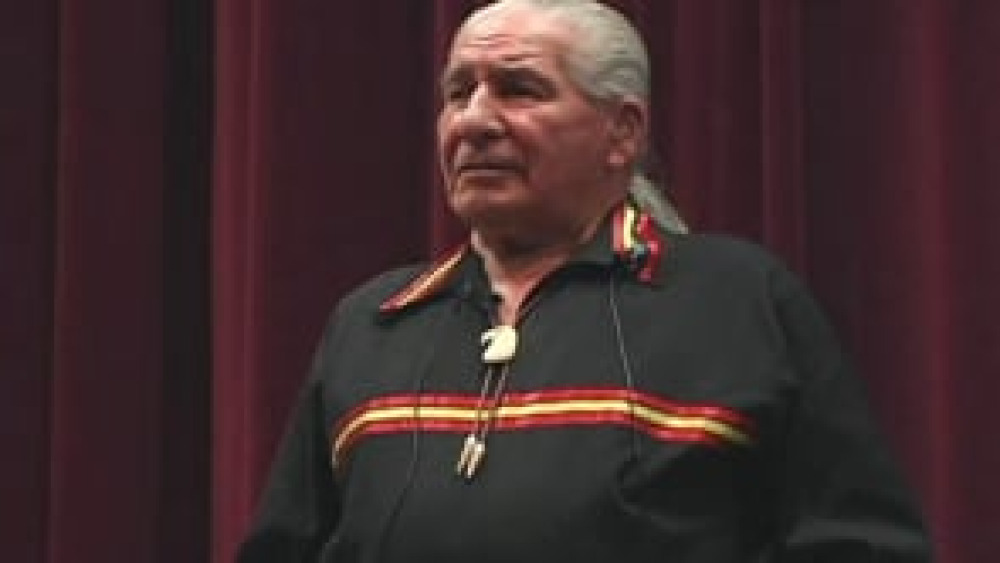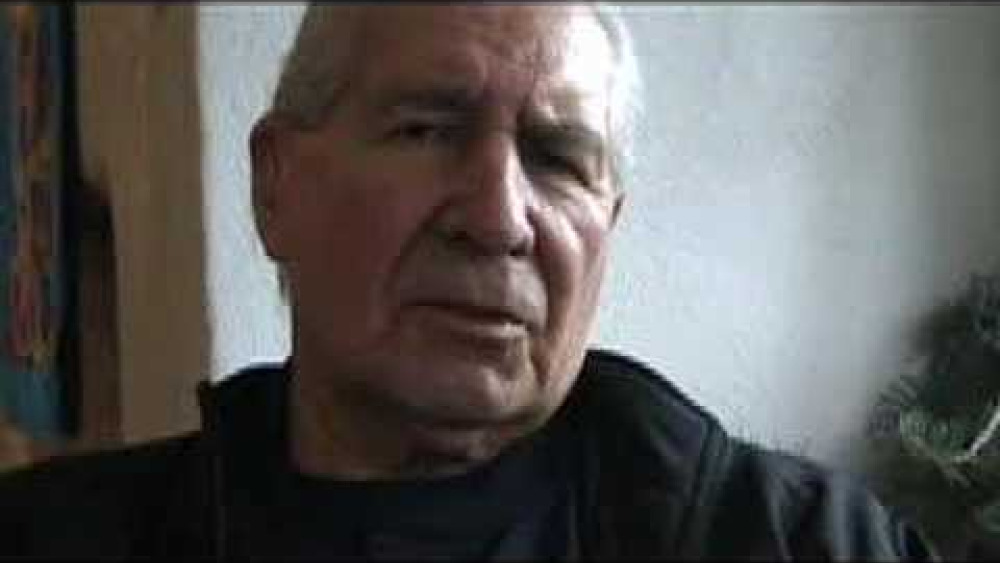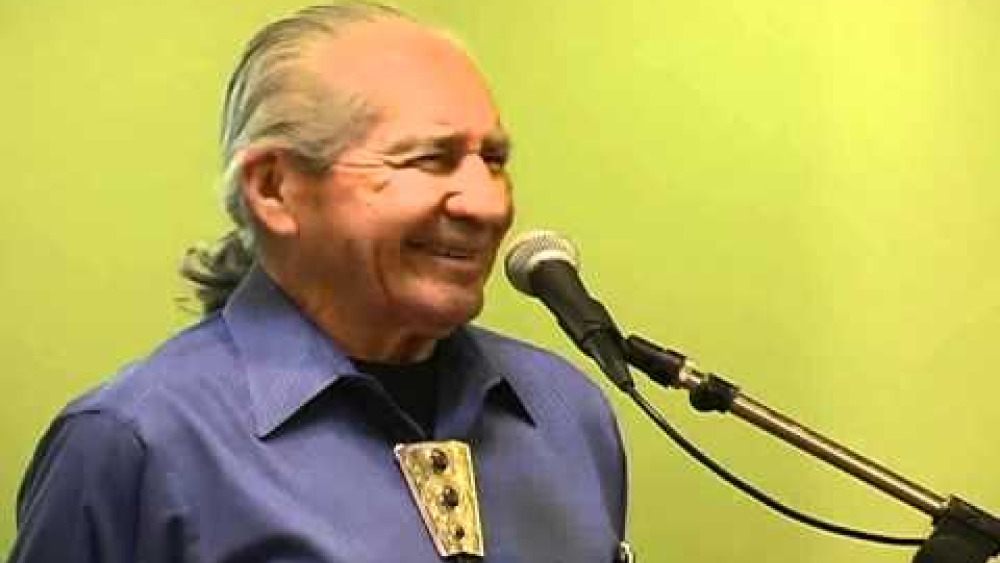Onondaga Chief and Faithkeeper Oren Lyons shares a story about late U.S. Senator Ted Kennedy's crucial yet little-known role in averting an attack by the federal government on those who took over Wounded Knee in 1973.
Additional Information
Lyons, Oren. "Wounded Knee II: Honoring the Legacy of Ted Kennedy." Honoring Nations symposium. Harvard Project for American Indian Economic Development, John F. Kennedy School of Government, Harvard University. Cambridge, Massachusetts. September 16-18, 2009. Presentation.
Transcript
"I'm going to tell a little story about Ted Kennedy. Rick [Hill] and I come from a rough-and-tumble neighborhood and we grew up in rough-and-tumble times; we have thick skin. And sometimes these things occur. It's not badly intentioned, it's just the way we are.
Anyway, it was in the later part of the standoff at Wounded Knee and the Lakota Treaty Council along with [Frank] Fools Crow, Matthew King, [Frank] Kills Enemy, sent emissaries to the Onondaga Nation; they wanted help. And because we were a traditional system and we talk about peace, they came and they asked if we could help to bring peace to this fight at Wounded Knee. And so we did and we went out. I talked with Secretary of State [William] Rogers before I left. If you remember during that time, President [Richard] Nixon was in a hole -- he had disappeared; he was under tremendous pressure. And the White House was under [John] Erlichman and [H.R.] Halderman. Anyway, Secretary of State Rogers said, he said, ‘Lakotas shooting Lakotas is one thing.' He said, ‘Lakotas shooting Iroquois is another.' And I said, ‘Well, we're not there to be shooting at one another. We're there to try to bring peace.' And he said, ‘Well,' he said, ‘we are not in charge of what's going on out there.' He said, ‘We've sent government officials there and they've been put in jail by the FBI.' He said, ‘They're out of control.' He said, ‘We can't guarantee...' I said, ‘I'm not asking for a guarantee. I'm just telling you we're going out there and I don't want you shooting me.' So he said, ‘Well, talk to our new Bureau of Indian Affairs man at Lakota at Pine Ridge before you go in.' I said, ‘Oh, well.'
So we had a number of people at Wounded Knee. We had, I don't know, maybe 25-40. We had a lot of people there. And Indian nations across the country had not publicly supported that, but Six Nations did. We made a public statement and we said we are going out there and we did. Anyway, I won't go through all that what happened there and so forth, but when we returned...because there was the highest security of a war zone that they said they had ever seen. I was talking to the journalists; they couldn't get further than Pine Ridge, which was some miles away from Wounded Knee. Anyway, we returned and we had given our contact number. And we said, ‘We're going to try to get this information to Washington and we'll see, you tell us.' So we received a message coming from a woman who was really a leader out there, tough fighter woman. And she said, ‘They're moving troops in. They moved in the perimeter about 100 yards last night, which is about 300 yards, which makes the fire very lethal in moving 100 yards. And the fire becomes very lethal. There were heavy exchanges of gunfire out there. And one night I estimated, we estimated over 70,000 rounds coming in. It was a real fight. And anyway, they said they're moving and they're going to assault on Friday. The information we have they're going to assault on Friday and they're going to use gas.' And I saw the canisters when we went into Pine Ridge. I saw those big canisters. I said, ‘What are those things for?' and got no answer. But anyway, I knew they had the gas there.
So we called the Chiefs, the Six Nation Chiefs who were on alert to move and we said, ‘Well, we have an option here. We have either to go to Wounded Knee right now or to Washington to see if we can avert.' And we had to make up our mind. I said, ‘Well, since they're just putting everybody in jail that showed up over there, we'd probably wind up in jail right away and be of no use. So maybe we better go to Washington.' So they sent two of us down, Chief [Irving] Powless and myself. This was '73, [I was] a little bit younger and a little bit springier than I am right now. And they said, 'See if you can talk to somebody and set up meetings for us.' So we went and we could get nowhere, nowhere. Monday went by, Tuesday went by; every door was shut. Nobody wanted to talk to us and everybody was in a hole, nobody wanted to move down there. They were paralyzed; Washington was paralyzed.
It was Tuesday night and I said to Irv, I said, ‘We better call the Chiefs, tell them to come down. Maybe all of us can do something.' So we called them and they came in the next morning -- 16 chiefs, some as old as eighty -- my age right now. So anyway, we went and all day Wednesday. We finally broke through with a congressman from New York, Congressman Hadley. And he met with us. And I said, ‘Okay,' I said, ‘we need to get to somebody who can get to the White House who can stop this assault, which is planned for Friday.' And we couldn't. He said, ‘Okay.' He's says, ‘I'll give you [James] Abourezk.' And we went to Abourezk . And curiously hostile, I don't know what it was, but our message was simply, ‘Look, we're not here to negotiate. We're here to tell you that they've cut off food supplies, which is against all of the rules of war. They're using starvation as a process.' And we went through, ‘These are 10 points we had.' And we said, ‘We're just here to tell you that on Friday there's a planned assault going in, and it's up to you to stop it. And when we leave here you'll be one that knows. And when Friday comes and the assault comes, we'll make it public that you knew and that's all we have to say.' And that was our message.
And we went around and we bounced off of Ted Kennedy's staff about three times. And then somewhere Thursday night, Thursday night -- we were tired, a lot of the old man. Luckily, it's an amazing thing; there was a young man who was driving a blue van. It had no windows. And he stopped and he said, ‘Where are you guys going?' We were going back and forth from the Senate to the House, Senate to the House. It's a long walk. I said, ‘Well, we're trying to do something about Wounded Knee.' He says, ‘Can I help you?' I said, ‘Yeah, give us a ride.' So he stayed with us all day moving us back and forth going to where we had to go. It was an amazing thing, helped us a lot because we had some old men there.
Anyway, Thursday night, we got a call from Kennedy's office. ‘I understand that you want to have a meeting.' ‘Yes, sir.' ‘Would you please come?' ‘Yes, sir.' And that was about 8 o'clock. So we went to his office and he had a beautiful office. He had the paneled walls -- big. And him and his staff were standing there, very formal. And so we drew ourselves up into a formal response. And he said, ‘What can I do for you?' We said, ‘Well, we're here to deliver a message. And the message is that tomorrow there's a planned assault on Wounded Knee,' and gave him our position. And he said, ‘You know,' he said, ‘I want you men to relax, sit down, have a seat, you've had a hard time.' He said, ‘Do you think you're hostile?' He said, ‘I just came from a Senate session where we have senators advocating a cavalry charge tomorrow.' He said, ‘I know what you're talking about.. I said, ‘Well,' I said, ‘all we have is the information, and it's confirmed.' And he said, ‘There's real hostility there, a cavalry charge [in] 1973.' And I said, ‘Well, we're here to see what we can do to stop it.' He picked up the phone, he said, ‘Have a seat, sit down.' And he called the White House, and I think it was Erlichman who picked up the phone. And he really, he really rendered a tirade that was memorable. And he said, ‘Don't you do it. If you do it,' he says, ‘we're going to have your ass.' And then he said, ‘I'm going to be on alert now,' and he finished his statement. And we looked at him, we thanked him. He said, ‘You men had anything to eat?' And we said, ‘Not yet.' He said, ‘It's pretty hard to get something around here this time of night.' He said, ‘But let me call and you guys go over.' And he says, ‘It's going to be on me.' So we had a big steak.
And that night I had to go. I had to leave that group and go on up to New York to try to do the same thing at the U.N. [United Nations]. And the men went home and we called back over there and told him, 'We think we've stopped it, but don't count on it,' because it was pretty bad out there. And as it turned out, it did stop the assault. And this past month, we were visiting [Washington, D.C.], we had planned to go over to Mr. Kennedy's office and hand him this letter of thank you. And it just so happened he couldn't make it there that day so he never received that letter. So we're going to send it to the family. But very few people know that. But when it was really needed and when we couldn't find maybe three or four friends on the [Capitol] Hill, he stood pretty tall. And we're ever grateful and to the whole family as a matter of fact. I think that if Robert Kennedy lived, he would have been the greatest advocate for Indians that this country would have ever seen [because] he was in that direction heavily. But that's the way it is. None of us are guaranteed to see sundown today. So that's the way life is. But I think you should know that this man has gone through a lot and anybody in public office catches hell, as you know. And I just wanted you to have that story about him. We'll make sure his family hears it, too. Thank you."



